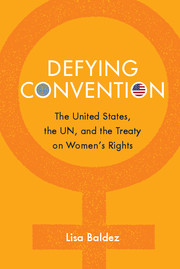Book contents
- Frontmatter
- Dedication
- Contents
- Acknowledgments
- 1 Introduction
- 2 A Scaffolding for Global Women’s Rights, 1945–1970
- 3 Geopolitics and Drafting the UN Treaty on Women’s Rights
- 4 An Evolving Global Norm of Women’s Rights
- 5 CEDAW Impact: Process, Not Policy
- 6 Why the United States Has Not Ratified CEDAW
- 7 CEDAW and Domestic Violence Law in the United States
- 8 Conclusion
- Works Cited
- Index
7 - CEDAW and Domestic Violence Law in the United States
Published online by Cambridge University Press: 05 August 2014
- Frontmatter
- Dedication
- Contents
- Acknowledgments
- 1 Introduction
- 2 A Scaffolding for Global Women’s Rights, 1945–1970
- 3 Geopolitics and Drafting the UN Treaty on Women’s Rights
- 4 An Evolving Global Norm of Women’s Rights
- 5 CEDAW Impact: Process, Not Policy
- 6 Why the United States Has Not Ratified CEDAW
- 7 CEDAW and Domestic Violence Law in the United States
- 8 Conclusion
- Works Cited
- Index
Summary
Conflicts between those who support U.S. ratification of CEDAW and those who oppose it have grown sharper over time. As this book has shown, advocates maintain that the Convention will strengthen U.S. foreign policy but will have relatively little impact in the United States. CEDAW opponents, on the other hand, predict that dire domestic policy consequences will ensue if the United States ratifies CEDAW. The intense conflicts between the two sides have obscured the fact that there are two points that the pro and con sides agree upon. First, American women already enjoy all the rights that CEDAW guarantees. The rhetoric of both sides rests on a claim that the status quo with regard to women’s rights policy in the United States is fine. Second, both sides concur that the private jurisdiction clause of CEDAW, which obligates states “to take all appropriate measures to eliminate discrimination against women by any person, organization or enterprise,” is a problem. CEDAW proponents consider the private jurisdiction issue as either moot because human rights treaties are non–self-executing, or easily circumvented through appropriate legislation or reservations. For CEDAW opponents, the private jurisdiction clause of CEDAW is its bête noir. Conservatives acknowledge the expanded scope of rights guaranteed by CEDAW – and fear it as a vehicle for unwanted state intervention into the private sphere. The con side sees the private jurisdiction clause as a problem that can only be avoided by not ratifying CEDAW in the first place. Neither side sees the private jurisdiction clause as a potential asset for women’s rights.
In this chapter, I examine the validity of these claims. Does U.S. law already guarantee the rights that CEDAW promises? Is the private jurisdiction clause of CEDAW a problem for women’s rights? I consider these questions with regard to domestic violence. If existing U.S. law is sufficient to protect women’s rights, then women should enjoy equal protection under the law with regard to domestic violence as well as other instances of discrimination against women. In cases of domestic violence, however, the private sphere provides little protection for women. Current strategies for protecting women hinge on redefining the boundaries between public and private life in order to permit law enforcement to intervene when intimate partners threaten women with violence. The private jurisdiction clause of CEDAW is thus potentially very relevant to anti–domestic violence policy.
- Type
- Chapter
- Information
- Defying ConventionUS Resistance to the UN Treaty on Women's Rights, pp. 183 - 199Publisher: Cambridge University PressPrint publication year: 2014

